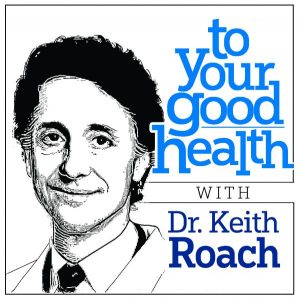TO YOUR GOOD HEALTH: Too much fruit juice can worsen diabetes
By Dr. Keith Roach — March 14, 2022
DEAR DR. ROACH: I have a friend who recently learned she’s prediabetic. She’s also very obese. She has started juicing her fruits and vegetables in order to lose weight and get healthier. Isn’t it just healthier to eat produce whole as opposed to making juice out of it? — N.F.E.
ANSWER: Eating more vegetables and fewer simple sugars and processed starches is a good idea for nearly all people who want to eat healthier, and it may help people lose weight. Fruits also are an important part of diet, but for people with or at high risk for diabetes, I recommend no more than one or two fruits with meals, and that the fruits be whole. Fruit juice is absorbed much more rapidly into the blood, so excess fruit juice can actually precipitate diabetes or worsen diabetes control.
Juicing makes it easy to consume vegetables and fruits, but in addition to the problem with faster sugar absorption, taking food in liquid form usually isn’t as satisfying. That’s not true for everyone, but since reducing calories is essential for weight loss in nearly everybody, juicing may have the opposite effect, unfortunately, and I don’t recommend it in general.
Of course, what doesn’t work for one person may work great for someone else. If she is able to change her diet, reduce unhealthy choices and lose some weight, then juicing may be just right for her. I would still recommend against too much fruit juice, and to have fruits mixed in with vegetables, preferably taken with some protein and healthy fat.
Never forget that exercise is the other critical intervention for diabetes prevention or control.
***
DEAR DR. ROACH: I am curious on your opinion of the benefits of CBD. I am a 73-year-old female with spinal stenosis that is pressing on a nerve. I also have pretty severe insomnia. I take 1,000 mg of hemp oil for severe back pain. I noticed that the CBD has helped me sleep mostly without drugs. A surprise effect of the hemp oil is my resting blood pressure has dropped. It used to range from 140-125/90 at doctors’ offices. Now I measure 110-118/86. As for the back pain, it has reduced the degree of pain I experience. Not completely, but it’s tolerable. I would be interested in a medical point of view. — J.F.
ANSWER: Cannabidiol (CBD), one of the major pharmaceutical extracts from hemp (cannabis), has been recommended for many issues, but is still poorly studied. Medical cannabis, which contains the psychoactive THC in addition to the nonpsychoactive CBD, has been studied for chronic pain and has been shown to be better than placebo. THC alone has also been studied for pain, but I haven’t found good studies on CBD alone for pain.
I might argue that you don’t need a study, that you have tried it and it works. It is true that some or all of the benefit you experienced could be due to expecting to feel benefit (the placebo response), but if you are having no side effects, I can’t argue with success.
I would note that chronic pain can cause sleep problems and raise blood pressure. Poor sleep itself can raise blood pressure. Thus, it’s not shocking that a treatment that improved pain also helped sleep and blood pressure.
blood
Dr. Roach regrets that he is unable to answer individual questions, but will incorporate them in the column whenever possible. Readers may email questions to ToYourGoodHealth@med.cornell.edu.
© 2021 North America Synd., Inc.
All Rights Reserved



